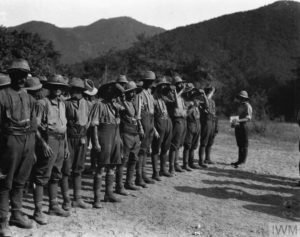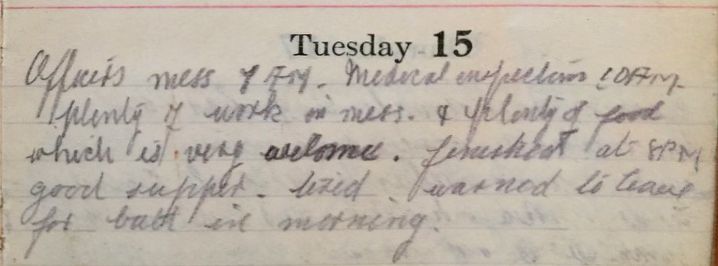Tuesday Jan 15th, 1918
Officers Mess 7am. Medical inspection 10am. Plenty of work in Mess and plenty of food – which is very welcome. Finished at 8pm. Good supper. Tired. Warned to leave for Battalion in morning.
Medical Inspection
Frank is preparing for his first time going up the line tomorrow. In his typically brief fashion he does not mention how he feels about such a prospect. However he does mention that he had a filling supper, if there’s anything we have learned about Frank it’s that he enjoys a good feed! Frank is also subject to a medical inspection, a regular occurrence and carried out to ensure that all men were fit and healthy. Particular focus was paid to the feet of the serving soldier, with officers and medical staff keeping an eye out for trench foot and frostbite, both preventable conditions which, if left untreated, would put the infantryman out of action.
Malaria

Another danger that medical staff had to be ever vigilant for was signs of malaria. The risk of contracting this disease was a very real one in Salonika due to the presence of malaria-carrying anopheles mosquitos. One of its challenges was its recurrence rate after the initial infection. As reported by H. Collinson Owen, editor of the Balkan News, ‘By the summer of the latter year [1918] the Salonika Army was full of listless, anaemic, unhappy, sallow men whose lives were a physical burden to them and a material burden to the Army; who circulated backwards and forwards between hospital and convalescent camps, passing only an occasional few days at work with their units, and then being sent away to do the round of hospital and “Con. Camp” again.’¹
Summing up the threat, G. Ward Price noted ‘the (Struma) valley is one of the most deadly malarial belts on earth, capable of contesting with West Africa…”‘²
To combat this the British soldier had to take regular courses of quinine, a task overseen by officers wary of men attempting to dodge taking the foul tasting medicine.
Today’s Battalion War diary entry shows the toll of both regular warfare and disease upon all ranks. Men were often moved to Labour Corps when they were unable to fulfil their combat duties:
13th (Service) Battalion War Diary – 15th January 1918 – Minden Camp, No.1 Sector
Our artillery was quiet all day but fired on traffic reported in Dojran Town at night. Enemy artillery was inactive until the evening. The usual few trench mortars fell on B2 & B4. Patrols heard working parties. Snipers are becoming active from O1 onto B4 & B6. Heavy shelling was heard away west probably across the Vardar. Operation Order No 31 (Appendix I) issued at 16:00 hrs. 2Lt JH Hodges having rejoined from hospital is taken on from 12-1-18. 5 OR invalided to UK from 31-12-17. 25 OR transferred to the Labour Corps with effect from….
References & further reading
¹ Wakefield, A. & Moody, S. 2017. Under The Devil’s Eye. Pen and Sword Military, Yorkshire, quote at Kindle locn. 4453 & info more generally on pages 166-171
² The Story of the Salonica Army – 1915-17‘ by G. Ward Price, written in 1917
* IWM Q. 32159, Image is subject to copyright


